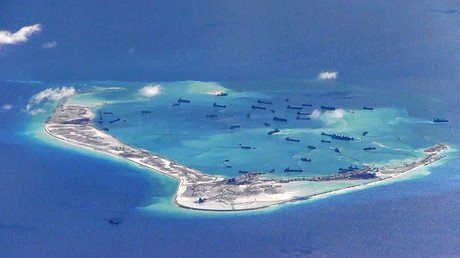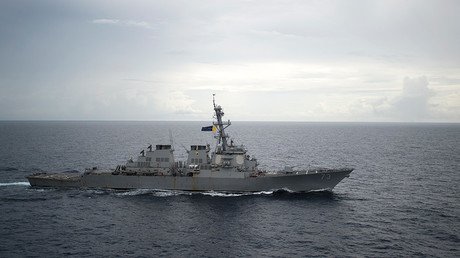‘Not a bargaining chip’: China warns US against questioning sovereignty & territorial integrity

China’s ambassador to the US has issued a strong warning to Washington, saying that Beijing will not tolerate any attempts to review the “political foundation” of bilateral relations. It seemingly follows Donald Trump’s remarks questioning the “One China” policy.
“The political foundation of China-US relations should not be undermined. It should be preserved,” Ambassador Cui Tiankai said at a meeting with bosses of top US companies, Reuters reported.
The Chinese diplomat went on to stress the necessity to comply with “basic norms of international relations,” which should not be regarded “as something you can trade off.”
“And indeed, national sovereignty and territorial integrity are not bargaining chips. Absolutely not,” Cui said.
Last week, US President-elect Trump once again ignited the ire of the Chinese state media after he said on Fox News that although he “fully understands” the One China concept, according to which Taiwan and China are viewed as a single Chinese nation, he sees no reason why the US acceptance of China’s authority over Taiwan should come at no cost for Beijing.
“I don’t know why we have to be bound by a ‘One China’ policy, unless we make a deal with China having to do with other things, including trade,” Trump said. That further inflamed the ongoing diplomatic row over Trump’s phone conversation with Taiwanese President Tsai Ing-wen.
'The Coming War on #China': #John Pilger's documentary airs on @RT_Dochttps://t.co/9PcYp34pDipic.twitter.com/qUXHGTjzwn
— RT (@RT_com) 10 декабря 2016 г.
While the White House tried to play down the incident, reassuring Beijing in its commitment to the One China policy, Trump’s stance raised serious concerns in China over the future of already strained relations.
The Chinese Foreign Ministry made it quite plain that if Washington no longer abides by the policy, it will face serious consequences.
READ MORE: Beijing holds surprise South China Sea drills in response to US patrol
Ministry spokesman Geng Shuang urged Trump’s incoming administration to “fully recognize the sensitivity of the Taiwan question,” calling the One China principle “the political bedrock” of bilateral relations. If Washington decides to disrupt the consensus, then “the sound and steady growth of China-US relations” will become “out of the question,” he warned.
The spat adds to a recent cooling in US-China relations, linked to the territorial disputes in the South China Sea. China refused to comply with the decision of the Permanent Court of Arbitration in The Hague from July that ruled against its historical claims “to resources” in the South China Sea, with the court downgrading the status of Spratly Islands, consisting of some 750 islets and reefs, to mere rocks. The case was brought by the Philippines, the long-term military ally of the US, which welcomed the verdict. The dispute also involves Taiwan, Malaysia, Brunei and Vietnam.
READ MORE: Between a rock and a hard (South China) place
On Wednesday, a Washington-based research institute published a report with photos indicating that China has been in process of installing “large anti-aircraft guns and probable close-in weapons systems (CIWS)” on the islands it had artificially constructed in the sea. Commenting on the reported military activity, the Commander of the US Pacific Command, Admiral Harry Harris, said that US would not “allow a shared domain to be closed down unilaterally,” adding that it “will be ready to confront when we must.”
In early October, US Navy staged inter-operability drills in the international waters of the South China Sea, involving two guided-missile destroyers and the Bonhomme Richard Expeditionary Strike Group (BHR ESG) with an aim to “practice defense in depth of the amphibious ships, including anti-submarine warfare and air defense scenarios and live-fire events.”
READ MORE: China No. 1 close reconnaissance target for US – think tank
Also in October, the guided-missile destroyer USS Decatur passed by Paracel Islands in the South China Sea, which have been under Chinese control. The islands are, however, also contested by Taiwan and Vietnam. The Chinese minister decried the maneuver, in course of which the ship was approached by two Chinese vessels who warned it to leave as “illegal” and “provocative,” shortly after announcing drills of its own.
“We strongly urge the US side to respect China’s sovereignty and national security concerns. Do not repeat the mistakes again,” the Chinese Defense Ministry said. The Pentagon responded that the “freedom of navigation” operation was “in full compliance with international law.”















